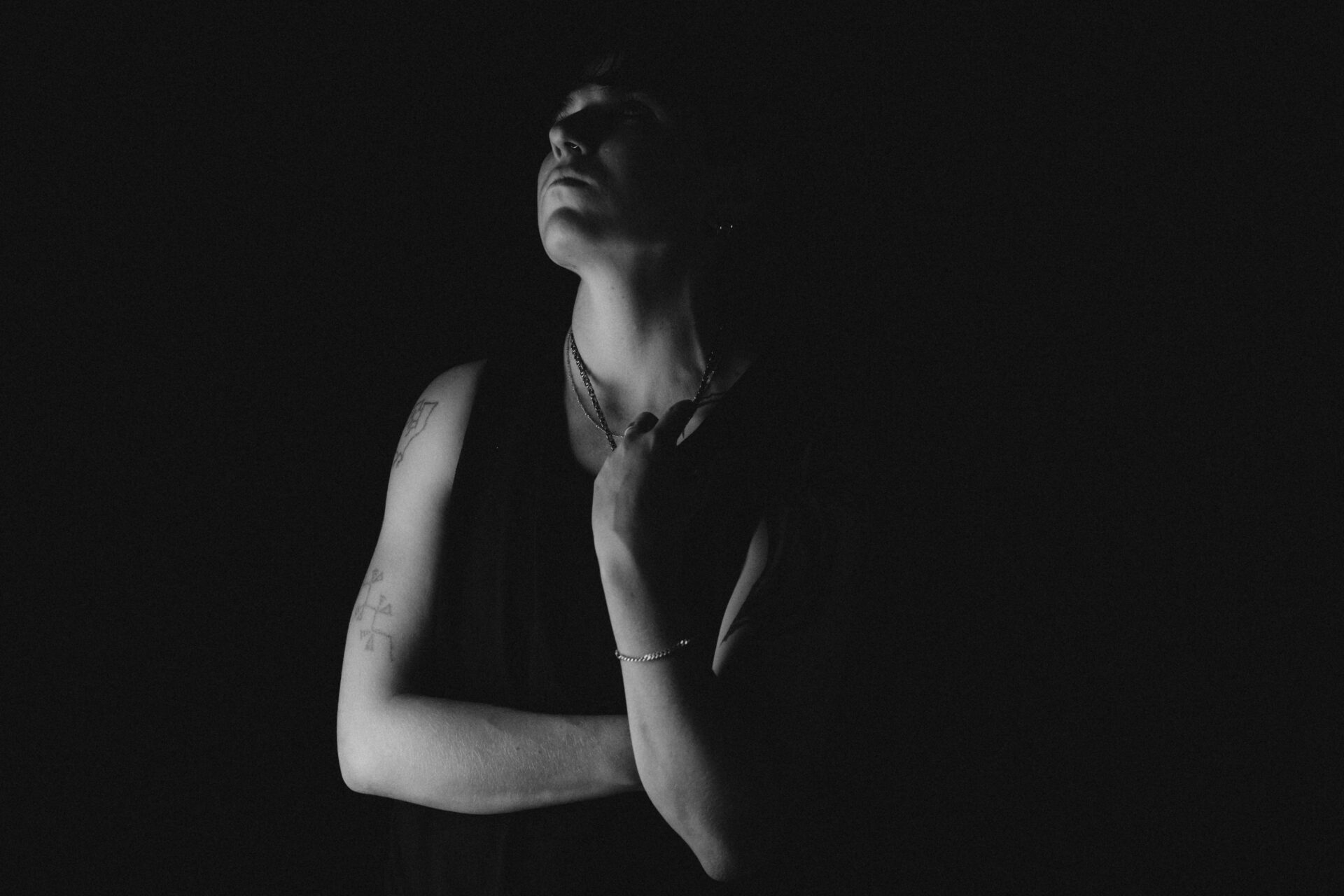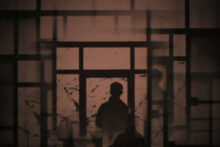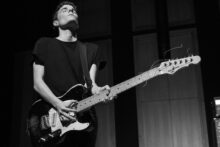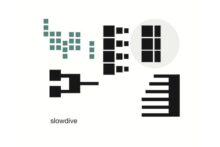Mysticism is a practice that aims to transform the practitioner. Whether it is the search for communion with God, which for the 16th Century Carmelite nun Saint Teresa of Ávila reportedly involved levitation, or revelation via trance-like repetition of poetry, which became an analogue of prayer for 20th Century French philosopher mystic Simone Weil. Those undergoing this type of ecstasy experience their own ego or self dissolving in the presence of the divine; such encounters can be pleasurable, as delirious speculations around what Saint Teresa was experiencing attest. Writer Anne Carson examines mysticism’s driving force in her essay Decreation: How Women Like Sappho, Marguerite Porete, and Simone Weil Tell God, and writes that these women know what love is, “that is, they know love is the touchstone of a true or a false spirituality”.
Jules Reidy channel this on their expansive and brilliant new album Ghost / Spirit, inspired by the writings of female mystics – and by the writing linked to above by their favourite essayist, Anne Carson. Ghost / Spirit, released by Thrill Jockey next week, is Reidy’s most ambitious record to date. It can be listened to as a collection of deconstructed songs about heartbreak but also as a string of aphorisms on spirituality and love. Musically, it is quite unique, featuring microtonal compositions played on a highly modulated combo of acoustic and electric guitar, with heavenly-sounding Auto-Tuned vocals and a wealth of samples provided by peers. Reidy, on Ghost / Spirit, doesn’t ask easy questions like, “Why don’t you love me?” Instead they ruminate on what love as a transformative power dares to do with the self: “When I disappear / I give myself to all / no forwards or backwards / only when I’m gone / only when you’re gone / can you reappear.” Reidy makes every word count, occupying a constantly shifting perspective; with vocals that sink and re-surface in from a sea of pulsating microtonality.
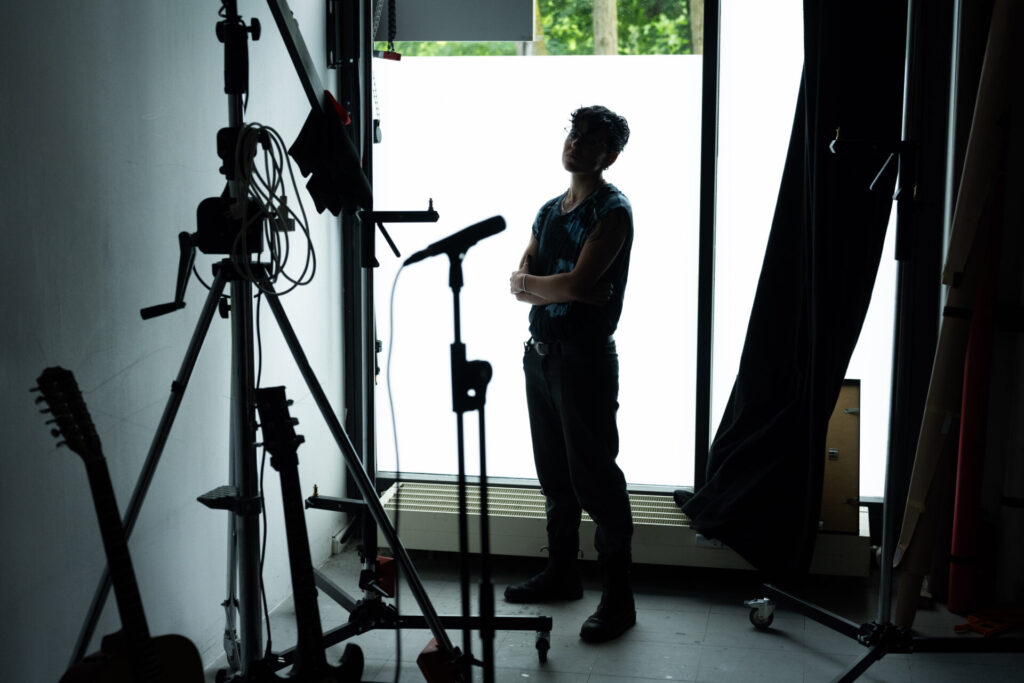
“The album is about a search for a divine, limitless quality of love, like a love for God. It’s a very humble record though, about wonderment and feeling very small”, they add. The title Ghost / Spirit refers to two experiences of love, worldly and divine, while it is also a reference to a piece at Mike Kelley’s recent exhibition Ghost And Spirit, showing currently at London’s Tate Modern. The show took its name from an as-yet-unrealised screenplay written by Kelley; and when Reidy read a couple of lines it contained – “A ghost is someone who disappears / An empty concept” – they struck home. Reidy adds: “A spirit is a memory (think: the spirit of something, it’s not there but it is).”
Originally from Sydney and now stationed in Berlin, Reidy’s output is dispersed between experimental imprints such as Editions Mego, Black Truffle, or Shelter Press. Their 12-string guitar performance inspired another Australian guitarist and Black Truffle boss, Oren Ambarchi, for his 2022 album Shebang, and attracted attention from institutions such as The JACK Quartet. Reidy, a guitarist with a history of playing in improvisational ensembles and a keen sense for exploring alternative tuning systems, has been trying to figure out how to play and sing, but without the results resembling the work of a more traditional singer-songwriter; although Ghost / Spirit is the closest their work has come to that category. Either way, the album feels like a brave thing to do and like a new chapter, especially when it is compared to previous long-form explorations on World In World from 2022 or Trances from 2023. The latter still had vocals more drowned back in the mix but was already attracting some “new age” fans – the resonating and filtered guitar lines sometimes could remind the listener of altar bells, although, it should be said, that Reidy’s meditative compositions have never spoken of a shallow engagement with these ideas.
When working on Ghost / Spirit, Reidy was immersed in reading Gravity And Grace by Simone Weil, who despite growing up in a privileged family, became a Marxist of conviction and got her hands dirty in a factory, and later fought fascism during the Spanish Civil War. Gravity And Grace was published posthumously, only surfacing to the light thanks to the diligence of a close friend of the writer. The book is a collection of maxims, or a manual of sorts, thanks to which Weil was hailed by T. S. Eliot as a “genius akin to that of the saints”. One of these aphorisms, detailing Weil’s idea of heavenly love and how humans can access that experience, took the residency in the back of Reidy’s mind:
“[One] only escapes from the laws of this world in lightning flashes. Instants when everything stands still, instants of contemplation, of pure intuition, of mental void, of acceptance of the moral void. It is through such instants that he is capable of the supernatural.”
The idea that divine love is accessible through prayer, contemplation, music, or anything that helps a participant’s ego to disappear allowing them to join a larger, more oceanic body, became central to Ghost / Spirit. “This state of disappearing is accessible ‘in lightning flashes’ because we can’t survive this world with no ego” Reidy says, reflecting a keen interest in studying Buddhism since a very young age. Such instants of disappearance, for Reidy, can be triggered by specific pieces of music, such as the divine-sounding, late Talk Talk masterpieces Spirit Of Eden and Laughing Stock. The writer Simon Critchley published a book recently, On Mysticism: The Experience of Ecstasy, which links this ecstatic experience with another popular musician, Julian Cope, arguing that it “lives on in the modern world as aesthetic experience”.
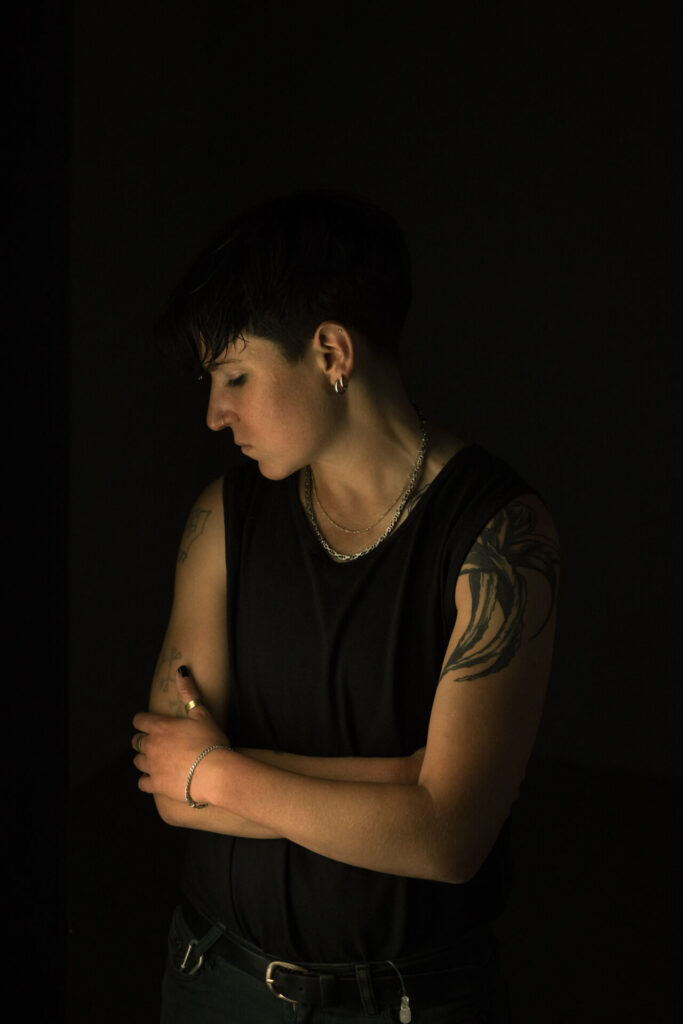
When Reidy started putting out solo long-form acoustic guitar adventures, albums such as the 2016 debut All is Ablaze or 2017’s Dawning On were immediately bracketed in the American primitivist guitar tradition, creating notional links to John Fahey, Robbie Basho and more revivifying contemporary exponents such as Daniel Bachman and Bill Orcutt. Even though these comparisons ring true to a certain degree, especially when considering their acoustic work, Reidy wasn’t formerly acquainted with this territory: “I only heard of those people after the comparisons were made, so I was like, ‘Oh, I better check them out’.”
As a kid, Reidy listened to Beach Boys and Crosby, Stills, Nash, and Young, groups played at home by their parents. Later, as a teenager they were consumed by heavy music of different types, all the way from Napalm Death to My Chemical Romance, but parallel explorations involved a deep dive into the back catalogues of Alice Coltrane and John Zorn. Reidy visited experimental music festivals like Sydney’s NOW Now: “I was a weird listener. When you’re a teenager, it’s all about trying to define yourself and figure out who you are. Besides total trash, I often listened to things that I didn’t really understand, but I wanted to know.”
After turning 18, Reidy began playing free improvised music as part of Splinter Orchestra, a formative period allowing them to create their own musical language. Two years later, they decided to move to Berlin: “I felt like everything else is in Europe and America. I made a whole bunch of friends in the experimental music scene in Berlin and joined a couple of bands that were playing lucrative shows, and back then, in 2014, it was still super affordable to live there.”
Their guitar language has been constantly evolving, shifting from acoustic to electric, between analog and digital – after a couple of albums, Reidy began augmenting their fingerpicking style with electronics, as on 2018’s Beholder, adding heavily processed vocals on 2019’s Brace, Brace. “After hearing that Burial record, Untrue, I thought I would try that. The delivery of all the vocals is so soulful and human, which works because the treatment and context are so harsh and alienating. I wanted to do it in a way that didn’t feel so terrifying because I wasn’t comfortable singing on stage”, remembers Reidy, who values those dark and gorgeous juxtapositions. “Looking back, I think of Brace, Brace as my ‘coming-out’ record. I had a recurring dream in which there was a plane crash; it went on for years until I came out, at which point it stopped.”
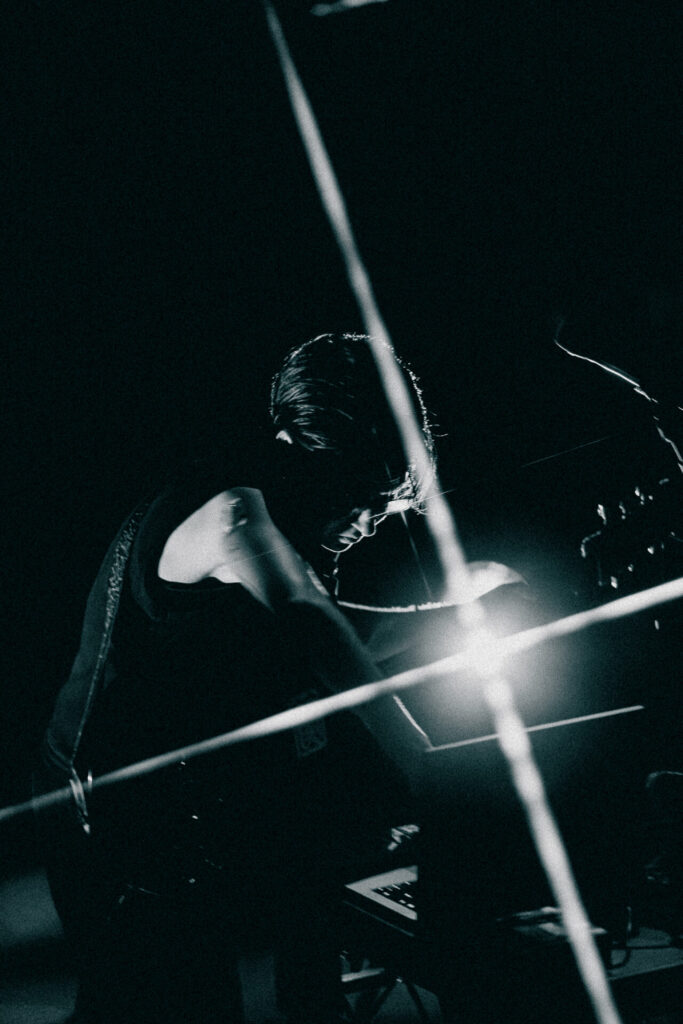
The 2021 album World In World led Reidy to their current setup and was a culmination of efforts to transcend the supposed boundaries of what the guitar was capable of. They were already exploring just intonation and other tunings, but this was the first record created using a guitar custom made by Sukandar Kartadinata, specifically to play in those systems; to test the limits of the sacred geometry of tunings. “I use the electric hexaphonic guitar,” explain Reidy, “which means that there’s a pickup under every string, so unlike a normal guitar that just comes out one like source, you can send the strings anywhere you want in the stereo fields, and you can also obviously manipulate every string independently.”
There is an urge to hack and overclock the instrument – in that sense, Reidy, with a special interest in DIY electronics, is closer to Harry Partch than John Fahey. These new possibilities of microtones exercised on World In World can call to mind some drone-oriented music made by the likes of Caterina Barbieri or other musicians associated with Stockholm’s Elektronmusikstudion (EMS), as the moveable fretboard allowed Reidy to realise ecstatic combinatorics and create unique tuning systems. “My Auto-Tune is tuned to 12-tone equal temperament like a piano keyboard”, describes Reidy in detail. “When you put that against a totally independent tuning system, it sounds weird and creepy.”
When I watched Jules Reidy operate an overclocked guitar at Prague’s Punctum venue recently, I was reminded of how shoegaze guitarists manipulate a cobweb of pedals to route audio signals in myriads of ways. In Reidy’s case, it’s more like putting a pedal after each individual string. There is the pleasure of texture, dissolving tones into oceans of sound, but at the same time the beauty of fingerpicking, where every strum is readable, as they can manipulate each string independently and do seemingly oppositional tasks simultaneously. “Loveless by My Bloody Valentine, with its huge immersive wall of sound, is a major influence on everything I’ve done,” says Reidy, confirming a hunch: “A lot of shoegaze is shallow, but Loveless is different. I feel like a lot of experimental music is geared towards this immersion state – this overwhelming rich and complex multifaceted sound interests me.”
The process behind Loveless – and similarly behind Talk Talk’s Spirit Of Eden – is based on micro-editing parts while using the recording studio as an instrument; a process that Reidy finds relatable. Kevin Shields of My Bloody Valentine famously had to edit the drumming parts because their stickman, Colm Ó Cíosóig, was suffering from pronounced problems during some of the sessions. “Both albums give you the feeling of a band playing live in a room, but it wasn’t created that way. That’s quite unambiguous with Ghost / Spirit too – it could almost be a band playing, but it’s not.” The album was partially constructed from material recorded by frequent collaborators; these samples being positioned in a way that was “deliberate and precise about arrangements… it’s very super organised”.
The elevating album opener, ‘Every Day There’s a Sunset’, uses reverberating bass samples by Andreas Dzialocha, who makes alternative pop with Reidy in Sun Kit; fellow musician Judith Hamann supplies cello parts on ‘Satellite’ and drummer Sara Neidorf from Berlin’s prog-metal circles offers rumbling and counterintuitive drum samples in ‘Every Day There’s A Sunrise’. Songs on Ghost / Spirit are open-ended and shade into each other, not possessing precise borders; they form cycles as if numerous parts are running in asynchronous loops, like one of the original visions for ambient. Sometimes, they reach stratospheric registers, as in one of many standout moments featured on the pulsating ‘Splits The Light’, where a subtle harmonica melody stretches out into a drone which teleports the listener away.
Reidy’s vocals are both anchoring and disorienting, and Auto-Tune becomes a device not only for pitch-shifting, but also identity-shifting. “Like several of my previous records, Ghost / Spirit deals with queerness and annihilation of (a sense of) self and the succession of a new identity”, they say and it is measurable to the personal transformation of female mystics, who had their lives altered by their encounters. “I’m not interested in purity in any sense but in subtle dissonances because it’s also my experience of being in the world, which is full of contradiction and impossibility”, Reidy explains. “I tried to harness both the painful and ecstatic experiences we have in our attempts to love, relate and connect. And then the notion that beyond those relationships there is a divine and limitless kind of love, and that that love is the entire universe, has given me a great sense of peace.”
Ghost / Spirit is out on 21 February via Thrill Jockey. Jules Reidy plays a selection of live shows in the UK and Europe this summer

